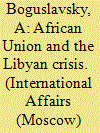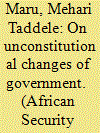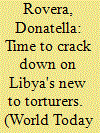| Srl | Item |
| 1 |
ID:
111936


|
|
|
|
|
| Publication |
2012.
|
| Summary/Abstract |
ARLY IN SEPTEMBER 2011, the forces of the National Transitional Council (NTC) of Libya backed, on a mass scale, by NATO assumed control over the larger part of the country and captured Tripoli. The regime change became a fact yet the country will have to tread a long and arduous road of rehabilitation of its now practically non-existent infrastructure and address a more important and even more challenging task of national reconciliation and revival of national unity. It seems that external military interference (far beyond the limits outlined by UN Resolution 1973) has made this dual task even harder to achieve. It caused unnecessary loss of civilian lives, stirred up hard feelings which pushed the east and west of the country apart, destroyed civilian objects and started uncontrolled proliferation of all sorts of weaponry.
|
|
|
|
|
|
|
|
|
|
|
|
|
|
|
|
| 2 |
ID:
119455


|
|
|
|
|
| Publication |
2013.
|
| Summary/Abstract |
In 2011, several months after a popular revolt overturned the Gaddafi regime in Libya, Libya's new National Transitional Council announced the discovery of what was later confirmed to be an undeclared stockpile of chemical weapons. This was a startling announcement to many observers, since Libya had publicly renounced its weapons of mass destruction (WMD) programmes in 2003 and had apparently dismantled the programmes soon after.
Although the Libyan case had repeatedly been referred to as a positive 'model' for nonproliferation - an instance where a country had voluntarily and peacefully rolled back its WMD programs - this recent discovery forces us to wonder whether the Libyan 'model' really was as successful as initially described.
This article examines the successes, challenges and lessons that can be learned from the Libyan case of WMD renunciation and verification. As one model of cooperative verification, the Libyan case highlights not only the opportunities afforded by monitoring and verification regimes, but also some of the difficulties that any such regime will encounter in real-world circumstances, however positive.
|
|
|
|
|
|
|
|
|
|
|
|
|
|
|
|
| 3 |
ID:
111541


|
|
|
|
|
| Publication |
2012.
|
| Summary/Abstract |
This short paper discusses the North African uprisings that led to the change of leadership in Tunisia and Egypt, and the issues surrounding the recognition of the National Transitional Council (NTC) of Libya by the African Union (AU) after the killing of Muammar Gaddafi. In doing so, the paper analyses the uprisings in North Africa vis-à-vis the AU normative frameworks related to unconstitutional changes of government and democratic constitutionalism. The implications of these AU policies on the recognition of the NTC and how the AU recognised the NTC afterwards is also discussed. Finally, some recommendations are made with regard to how the AU should deal with similar uprisings in Africa in the future.
|
|
|
|
|
|
|
|
|
|
|
|
|
|
|
|
| 4 |
ID:
132422


|
|
|
| 5 |
ID:
123241


|
|
|